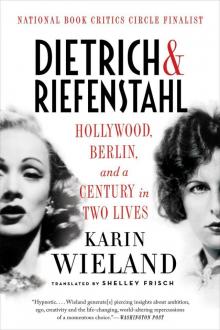Dietrich & Riefenstahl: Hollywood, Berlin, and a Century in Two Lives 

Genre: Other6
Published: 2015
View: 3948
Read OnlineRead Dietrich & Riefenstahl: Hollywood, Berlin, and a Century in Two Lives Storyline:
Boston Globe Best Book of 2015 Washington Post Best Book of 2015Magisterial in scope, this dual biography examines two complex lives that began alike but ended on opposite sides of the century’s greatest conflict.Born at the dawn of the twentieth century, Leni Riefenstahl and Marlene Dietrich both came of age in Weimar Berlin, a time of great political ferment. Glamour and decadence thrived beside abject poverty, and the German capital’s outpouring of literature, fashion, and film marked it as the most vital European metropolis. As young women of this era, Dietrich and Riefenstahl lived so close to each other that Riefenstahl could see into Dietrich’s apartment from the roof of her building. Both women seized upon the revolutionary energy of the 1920s, seeking careers on the stage and in film.In 1929, filmmakers were casting what would become the iconic role of Lola-Lola (who made "Falling in Love Again" a sensation) in the groundbreaking sound film The Blue Angel. Riefenstahl—whose work in her "mountain films" had already made her a national emblem for the athletic rigor and spirited independence of the New Woman—hoped for the part but didn’t get it. Only a few years later she became the official filmmaker of the Third Reich. Dietrich, however, won the role and the adoration of millions when she moved to Hollywood and redefined the "vixen" for a new era.While Dietrich's slender and androgynous beauty made her a fashion icon whose influence can be seen to this day, Riefenstahl’s own iconography is no less indelible. With her work on two of the most notorious—if artistically sophisticated—propaganda films of all time—Triumph of the Will and Olympia—Riefenstahl was a progenitor of fascist symbolism. After the war she proclaimed her ignorance of Hitler’s motives, but she could never completely distance herself from her Nazi collaboration. Dietrich vehemently condemned Hitler during World War II and found a renewed sense of purpose touring with the USO, but as a result she could never comfortably return to her native Germany.Both women were "prodigies of will, discipline, endurance, self-reinvention, and exaltation of the body in all its muscular, androgynous, pose-striking pagan glory" (James Wolcott), and both had their grand passions, but neither abandoned ambition for the sake of love. As award-winning biographer Karin Wieland shows, in their later years, both women grappled with controlling their image—Riefenstahl by pursuing an additional career in photography, and Dietrich by eventually hiding at home as her famous beauty was ravaged by time.Skillfully juxtaposing these two fascinating lives, Wieland brings to vivid life a time of international upheaval, chronicling radical evolutions of politics, fame, and femininity on a grand stage. Examining the moral responsibility of the artist, Wieland poses questions as deeply relevant to our century as to the last. A magisterial portrait of two diverging but lasting images of the modern woman, Dietrich & Riefenstahl is "a superb" (Die Zeit) panorama of the twentieth century.**Review“Wieland is shrewd…about her subjects and has done serious work…that give her book credibility, texture, and unending interest. This is the story of two glamorous women whose achievements in another time might have been no more substantial than the images on a screen but who assumed real-life roles with the highest historical stakes.” (Claudia Roth Pierpont - The New Yorker) “In this lively, deliciously gossipy dual biography, Karin Wieland treats both with great sympathy but also clear-eyed assessment.” (Kate Tuttle - Boston Globe) “[With] hypnotic power…. Wieland uses these two virtuosos’ lives to generate piercing insights about ambition, ego, creativity and the life-changing, world-altering repercussions of a momentous choice.” (Michael Sragow - Washington Post) “Illuminating…. Via a fluent, often witty translation by Shelley Frisch, Wieland draws the portrait of women who were ambitious to a degree stunning in their day. Moreover, by tracking their divergent careers together, she is able subtly to suggest some answers to a question that hangs over every mid-century German artist: what kind of responses were available to the Nazi apocalypse?” (Farran Smith Nehme - The Guardian (UK)) “A sweeping, revelatory dual biography.” (Kirkus Reviews (starred review)) “Marlene Dietrich and Leni Riefenstahl have found an ideal biographer in Karin Wieland. She brings a lively style, a wealth of detail, and a perfect balance between skeptical objectivity and measured sympathy to her account of the parallel and then diverging lives of these two ambitious women.” (Celia Applegate, Vanderbilt University) About the AuthorKarin Wieland lives in Berlin and is an historian of political theory at the Hamburg Foundation for the Advancement of Science and Culture.Shelley Frisch is the prize-winning translator of biographies of Nietzsche, Einstein, and Kafka. She lives in Princeton, New Jersey.**
Pages of Dietrich & Riefenstahl: Hollywood, Berlin, and a Century in Two Lives :